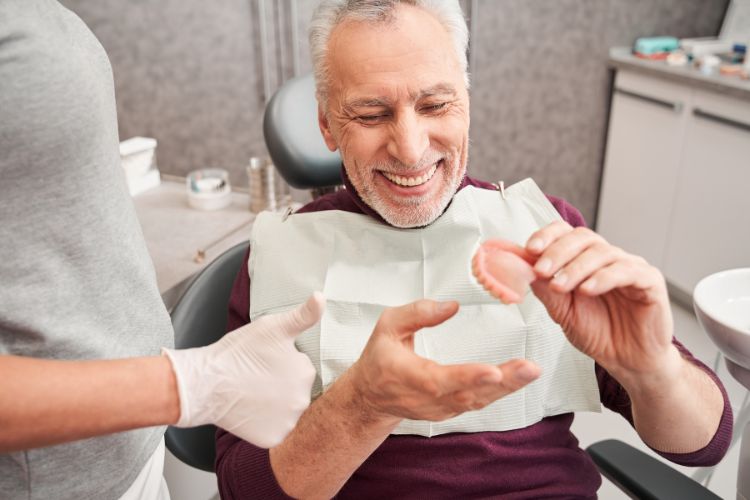Properly fitting dentures
Everything you need to know about properly fitting dentures
Are you considering dentures to restore your smile and improve your quality of life? At College Hill Dental Group, we understand the importance of properly fitting dentures for optimal comfort and functionality. In this comprehensive guide, we’ll cover everything you need to know about denture fitting, ensuring that you make informed decisions about your oral health.

Understanding Dentures
Dentures are removable oral appliances designed to replace missing teeth and restore the appearance and function of your smile. They consist of artificial teeth set in a gum-colored acrylic base, which is custom-made to fit comfortably over your gums. Dentures can be full (replacing all teeth in an arch) or partial (replacing several missing teeth).
The Importance of Properly Fitting Dentures
Properly fitting dentures are essential for comfort, stability, and functionality. Ill-fitting dentures can cause discomfort, difficulty chewing and speaking, mouth sores, and even bone loss over time. Working with a skilled dentist who can ensure that your dentures are tailored to fit your unique oral anatomy is crucial.
The Denture Fitting Process
Initial Consultation: During your initial consultation at College Hill Dental Group, our experienced dentists will assess your oral health, discuss your tooth replacement options, and determine if dentures are the right choice for you.
Impressions: Once you’ve decided to proceed with dentures, our team will take detailed impressions (molds) of your mouth. These impressions will serve as the foundation for creating your custom-fitted dentures.
Trial Fitting:
After taking your impressions, we will create a wax model of your dentures for a trial fitting. This allows you to experience how the dentures will look and feel in your mouth before we fabricate the final restorations.
Final Fitting: After making any necessary adjustments to the wax model, we will fabricate your final dentures. During the final fitting appointment, our dentists will ensure that your dentures fit comfortably and securely, making any final adjustments as needed.
Caring for Your Dentures
Proper care and maintenance are essential for prolonging the life of your dentures and preserving your oral health. Here are some tips for caring for your dentures:
- Remove and rinse your dentures after eating to remove food debris.
- Brush your dentures daily with a soft-bristled toothbrush and denture cleaner.
- Soak your dentures overnight in a denture cleaning solution to keep them clean and fresh.
- Visit College Hill Dental Group regularly for check-ups and adjustments to ensure that your dentures continue to fit properly.
Why Choose College Hill Dental Group?
As the best dentist in Easton, PA, College Hill Dental Group is committed to providing exceptional dental care and personalized treatment plans tailored to each patient’s unique needs. Our experienced dentists have the skills and expertise to ensure that your dentures fit comfortably and function effectively, allowing you to enjoy a confident smile and improved quality of life.
Schedule Your Consultation Today
Ready to restore your smile with properly fitting dentures? Schedule a consultation with College Hill Dental Group today! Our friendly team is here to answer your questions, address your concerns, and help you achieve a healthy, beautiful smile. Don’t wait – contact us now to begin your journey to improved oral health and confidence.







